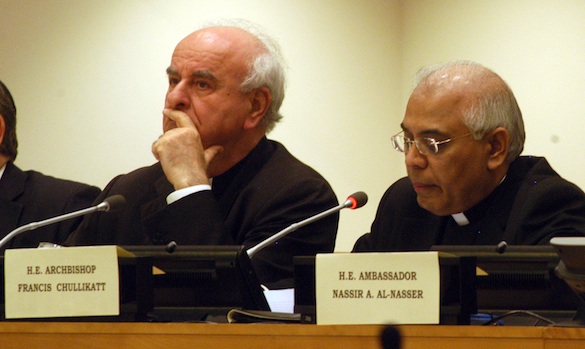by Marie Elena Giossi
Calling family “indispensable and irreplaceable” in human development, a high-ranking Vatican official called for a “renewal of family models” when he spoke at the U.N. in Manhattan earlier this month.
Archbishop Vincenzo Paglia, president of the Pontifical Council for the Family, said that “In spite of today’s hostile cultural environment, a clear majority of persons want a family at the center of their life.”
The archbishop was a guest speaker at “The Family at the Heart of Development,” a conference hosted by the Holy See Mission to the U.N., along with the Pontifical Council for the Family, in observance of the International Day of Families, May 15.
The event was conducted in conjunction with the 20th anniversary of the International Year of the Family, proclaimed by the U.N. General Assembly to raise awareness about the importance of families and the challenges they face.
Opportunities for Growth
Societal changes in recent years, including the rise of single-parent families and drop in sacramental marriages, have thrown the family into crisis, which “could also be an opportunity for growth,” the archbishop noted.
The issues and challenges facing family life today are part of what has prompted Pope Francis to convene a special Synod of Bishops this October to examine the reality and challenges of family life today.
A second synod is to be held in 2015 and will be followed by the eighth World Meeting of Families in September, 2015, in Philadelphia. Archbishop Paglia was visiting the U.S. this month in preparation for that gathering.
In New York, the archbishop addressed nearly 100 people from various interest groups at the event, which was organized outside the world body’s official sessions for the purpose of highlighting and sharing dialogue on the issue of family. Representatives from the National Right to Life, Family Watch International and the U.N. Population Fund were among those in attendance.
“The family, by making possible a delicate but stable community of life among different persons,” the archbishop said, “has been able to foster and protect the sensitive relations between individuals and diverse social realities, thus allowing for the harmonious development of society as a whole.”
But that harmonious development cannot be achieved, he said, when modern families fall victim to “familyism,” the tendency to favor the good of the smaller family group over that of the larger community, or submit themselves to the “inhuman consequences” of being hyper-individualistic and hyper-technological.
Though the family is more “fragile” than it was in the past, Archbishop Paglia said, “The family remains – thanks paradoxically to its defects and limits – the locus (of) the mystery of life and of history. … a patrimony for all humanity.”
Along with Archbishop Paglia, the panel featured Rabbi Abraham Skorka of the Jewish Community Benei Tikva of Buenos Aires, Argentina; Nassir Abdulaziz Al-Nasser, U.N. High Representative for the Alliance of Civilizations; and Donna Fitzpatrick Bethell, chair, board of directors of Christendom College, Front Royal, Va., and Imago Dei, Inc.
Archbishop Francis Chullikatt, the Holy See’s permanent observer to the U.N., opened the afternoon session by offering introductory remarks.
“Healthy relationships in marriage and the family are of greatest importance in the development and well being of the human person,” he said. “Stable families provide significant benefits for the community, while the breakdown of families affects and harms individual and social development.”
“Healthy families generate healthy societies,” Archbishop Chullikat said.
That simple but key message was something both Catholics and non-Catholics need to hear, noted Msgr. Peter Smith, a priest of the Archdiocese of Glasgow, Scotland, who is on staff at the Holy See Mission to the U.N.
“The importance of family is something we need to talk to people about,” he said, following the session. “To support and assist families is fundamental to moving forward and even people who don’t agree need to hear us speak the truth.”
Earlier this month at a U.N. committee meeting against torture, the Holy See was berated and told its stance against abortion is a human rights abuse, a form of torture.
“It is important for the U.N. to hear different aspects,” Msgr. Smith added.

